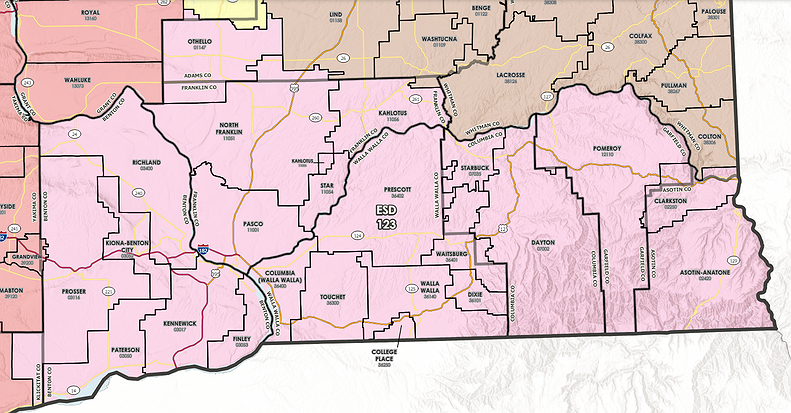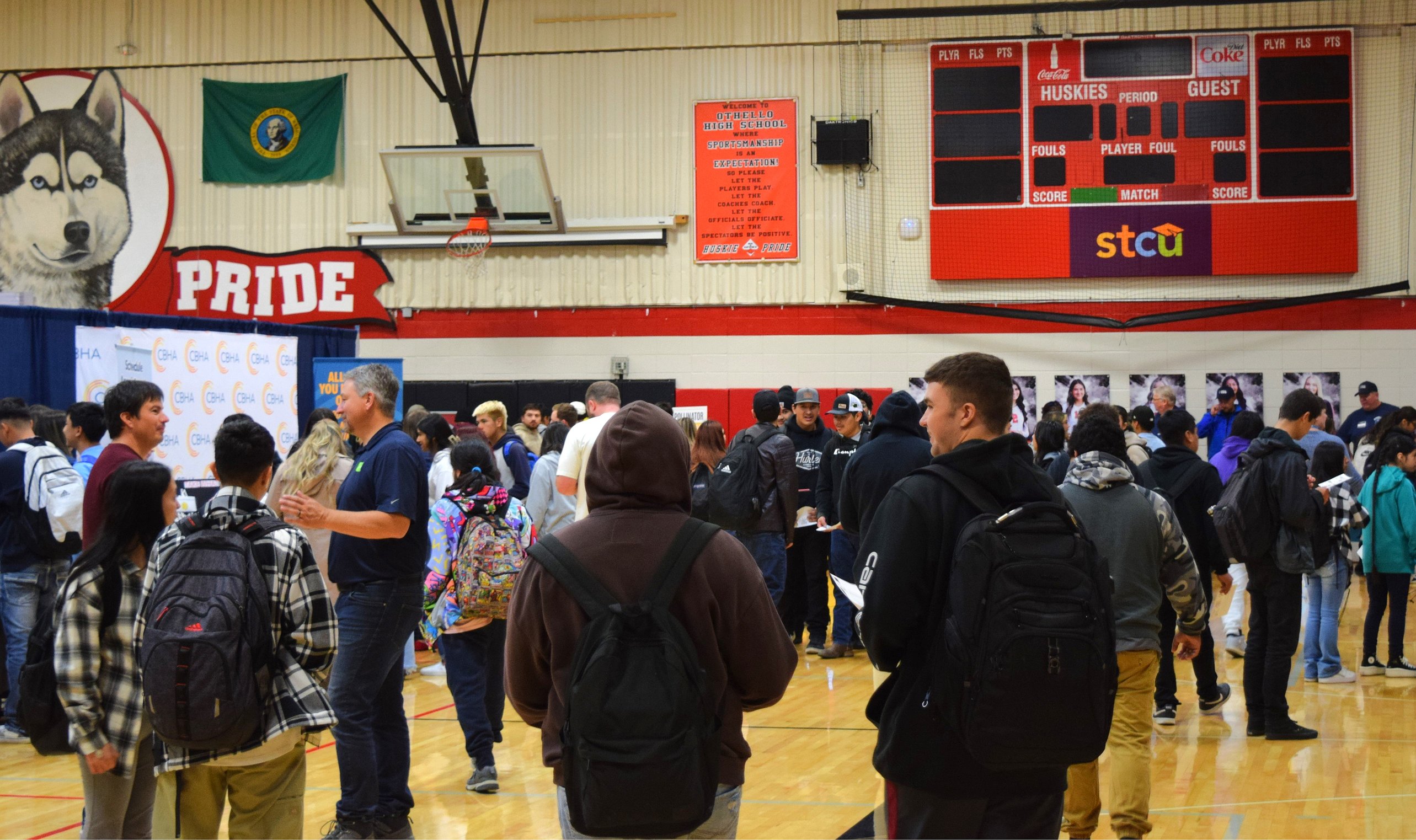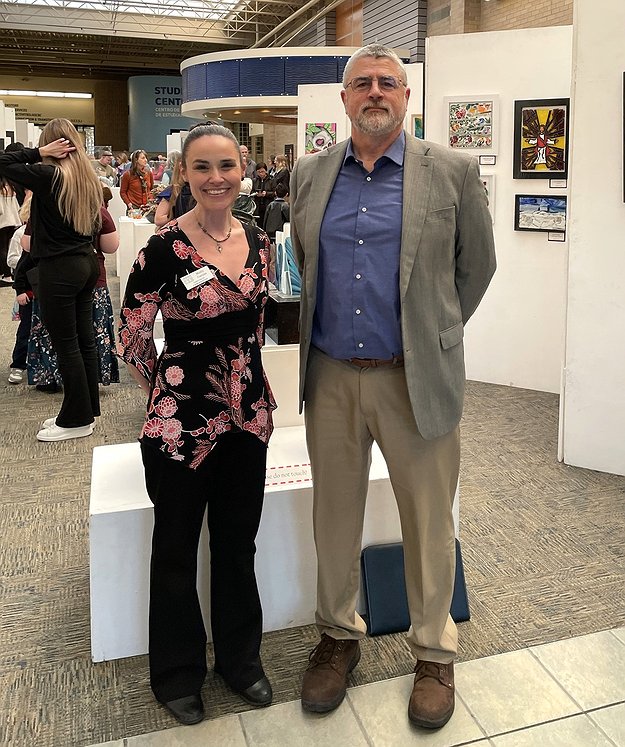Educational Service District 123 Superintendent discusses priorities, services
PASCO — Washington Educational Service District 123, based out of Pasco, serves 23 school districts in seven counties of Southeastern Washington — including Othello School District — with more than 70,000 students, according to ESD 123’s website.
Superintendent Steve McCullough discussed some of the district’s priorities and focuses in the near future.
“Our mission is about helping all students realize their dreams and aspirations,” McCullough said. “So, number one, we're about enhancing student learning in our region and across the state. Number two, we do that through supporting our local school districts. So we're trying to help them be more efficient and effective.”
According to the website, McCullough works under a board of directors to manage ESD 123, which is a legislatively mandated, not-for-profit educational organization for helping school districts.
“We help them collaborate with each other as well or collaborate with other partners,” he said. “(It’s) a lot of advocacy work, either regionally or across the state, or even federally, working on different issues that impact our education. And we provide very specialized services in certain situations in order to meet the needs of our students in our region and of our school districts.”
Services
School districts under ESD 123’s purview range from smaller, rural districts to the larger and more complex districts in the Tri-Cities area.
“For the more rural and smaller districts, the range of different types of services that they might need from us is probably a lot broader. We support them maybe with communications, we might provide a specialist like a school psychologist or somebody who's a behavior specialist,” he said. “There are programs we (offer to) every district … For example, (the state) provided funding for each ESD to support the health program, to be a liaison with our Department of Health to help all districts in the region navigate through the COVID rules and regulations.”
McCullough said more specific programs are sometimes necessary.
“We started up something called Candy Mountain Academy, several years ago, and it's a school designed to support high-needs behavior students, and we have students from our Tri-Cities region and we have students from outlying regions that access that service,” he said. “So we're always looking for what is that area that a district is not able to do, or maybe we can do more efficiently.”
McCullough said each service district varies in some regard in the services that it offers.
“Probably (about) 75% of them are consistent across all ESDs … So there are like 25% that might be really unique to our region, or maybe to a couple of regions,” he said. “An example is (Early Childhood Education and Assistance Program). We run early childhood programs in quite a few districts in our region or even outside of our region. Whereas (ESD) 105, they provide more headstart programs.”
ESD 123 is part of the Washington Association of Educational Service Districts.
“All nine ESDs work together, so we have programs that we share and we roll out together,” he said. “But then, based on the needs of our region, we do different things.”
McCullough elaborated on how the ESD is funded.
“About 1% of our funding comes directly from the state of Washington, and then the rest of it is either through grants or fees for service or maybe a proviso that comes through (The Office of Superintendent of Public Instruction) for specific purposes,” he said.
Priorities
McCullough also discussed some of the district’s focuses in running its operations.
“One of the areas that districts are focused on and we're looking to make sure that we provide sufficient help for is just helping with student mental health,” he said, “and how do we make sure we meet the needs of students in that area … That is probably one of the ones that is talked about the most right now.”
Student Assistance Professionals operate through ESDs in many districts in the state, McCullough said, positions that were funded through COVID relief funds and emergency funding.
“Those weren't funded this last legislative session, but they were highly effective, with a lot of data to back up their effectiveness in the school,” he said. “So all the ESDs will be, along with OSPI, bringing those issues back to the legislature next year, as a way to say, ‘Hey, this is a need of our school districts. This is what we did and how successful it was, please fund it moving forward.’”
McCullough said he sees school districts’ need for ESD 123’s services only growing.
“Another area that we're looking at, (that) all of us are looking at growing, is our fiscal support,” he said. “We get some direct funding from the state of Washington, but there are a lot more districts out there that are struggling financially … That's an area we're going to be asking the state potentially for more funding to help support that.”
McCullough said community members can always contact the district, which can at least point them in the right direction if they need assistance or are looking for a specific service.
“We do youth mental health and adult mental health first aid training. That’s something we provide, something that’s definitely good for people to know they can access,’ McCullough said. “We provide a service called TC-Futures that reaches out and works with students who are no longer in school and still need to get a diploma, and works with them to get a GED and provide a lot of support in the process.”
The district’s services are not just for students.
“We do a lot of training for teachers, so that's another area we really do a lot of work with,” he said. “We have developed quite a large migrant program that works in our school communities supporting our migrant population, so that's another one that's very active in our community.”
Overall, ESD 123 both assists and advocates for its school districts in many different ways and regarding many different topics.
“If one school is suffering or struggling with an issue, there are others that are probably having some similar problems as well. So as a superintendent, I keep up on all the different educational trends,” he said. “All the ESD superintendents, we meet consistently to talk about what's happening in our regions, so we've been on top of those different trends. We are meeting with legislators, we're talking at both the federal and state level to keep up on what's going on, so that we can make sure that we're staying ahead of some of those trends.”
For more information, visit www.esd123.org.
School Districts serviced by ESD 123
Asotin-Anatone
Clarkston
College Place
Columbia
Dayton
Dixie
Finley
Kahlotus
Kennewick
Kiona-Benton
North Franklin
Othello
Pasco
Paterson
Pomeroy
Prescott
Prosser
Richland
Star
Starbuck
Touchet
Waitsburg
Walla Walla
Gabriel Davis may be reached at [email protected].







